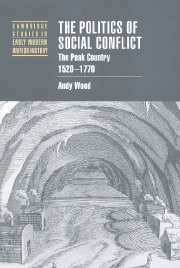Book contents
- Frontmatter
- Contents
- List of figures
- List of tables
- List of maps
- Preface
- List of abbreviations
- Introduction ‘Terms we did not understand’: landscape, place and perceptions
- 1 Social relations and popular culture in early modern England
- Part I The structures of inequality
- Part II The conditions of community
- Part III The politics of social conflict
- 9 ‘Pyllage uppon the poore mynorz’: sources of social conflict, 1500-1600
- 10 ‘All is hurly burly here’: local histories of social conflict, 1600-1640
- 11 The peak in context: riot and popular politics in early Stuart England
- 12 ‘Prerogative hath many proctors’: the English Revolution and the plebeian politics of the Peak, 1640–1660
- 13 The experience of defeat? The defence of custom, 1660–1770
- 14 The making of the English working class in the Derbyshire Peak Country
- Bibliography
- Index
- Cambridge Studies in Early Modern British History
9 - ‘Pyllage uppon the poore mynorz’: sources of social conflict, 1500-1600
Published online by Cambridge University Press: 27 July 2009
- Frontmatter
- Contents
- List of figures
- List of tables
- List of maps
- Preface
- List of abbreviations
- Introduction ‘Terms we did not understand’: landscape, place and perceptions
- 1 Social relations and popular culture in early modern England
- Part I The structures of inequality
- Part II The conditions of community
- Part III The politics of social conflict
- 9 ‘Pyllage uppon the poore mynorz’: sources of social conflict, 1500-1600
- 10 ‘All is hurly burly here’: local histories of social conflict, 1600-1640
- 11 The peak in context: riot and popular politics in early Stuart England
- 12 ‘Prerogative hath many proctors’: the English Revolution and the plebeian politics of the Peak, 1640–1660
- 13 The experience of defeat? The defence of custom, 1660–1770
- 14 The making of the English working class in the Derbyshire Peak Country
- Bibliography
- Index
- Cambridge Studies in Early Modern British History
Summary
LATE MEDIEVAL QUIESCENCE
In 1497, the Court of the Duchy of Lancaster heard complaint from Henry Foljamb esquire, a prominent member of Derbyshire's gentry, and the lessee of its right of lot and cope within the Wapentake of Wirksworth. Foljamb objected to an alliance formed against him by two other powerful gentry families: the Leakes and the Babingtons. At some time in the 1470s, the Leakes had prevented the free miners of Wirksworth from entering the fields of neighbouring Cromford to dig for ore. The miners were still barred in 1497, and Foljamb thereby lost valuable revenue from his tolls upon their production. Moreover, he was hindered in his collection of lot and cope by the intransigence of the barmaster, Roger Vernon. As for the miners, they lacked sufficient assertion to challenge the Leakes, and told Foljamb that they ‘durst not’ enter Cromford, for George Leake had ‘discharged all the myners that they shuld geytt no hoore [ore] bott if it were doin be his Comandment’. Furthermore, the inhabitants of Cromford were ready to ‘damme theyr owin sawles [souls]’ to give evidence in favour of Leake and the Babingtons. Yet Foljamb insisted none the less ‘that theyr was no man lyffyng that cowyde prefe [prove] bott as the kinge hathe had Allway the Lott and Cowpe here of all the town & felds of Cromforthe’, and hence that a right of free mining existed there.
- Type
- Chapter
- Information
- The Politics of Social ConflictThe Peak Country, 1520–1770, pp. 203 - 217Publisher: Cambridge University PressPrint publication year: 1999



